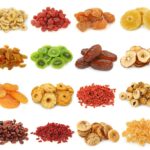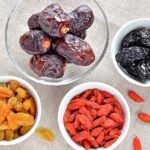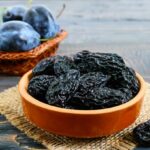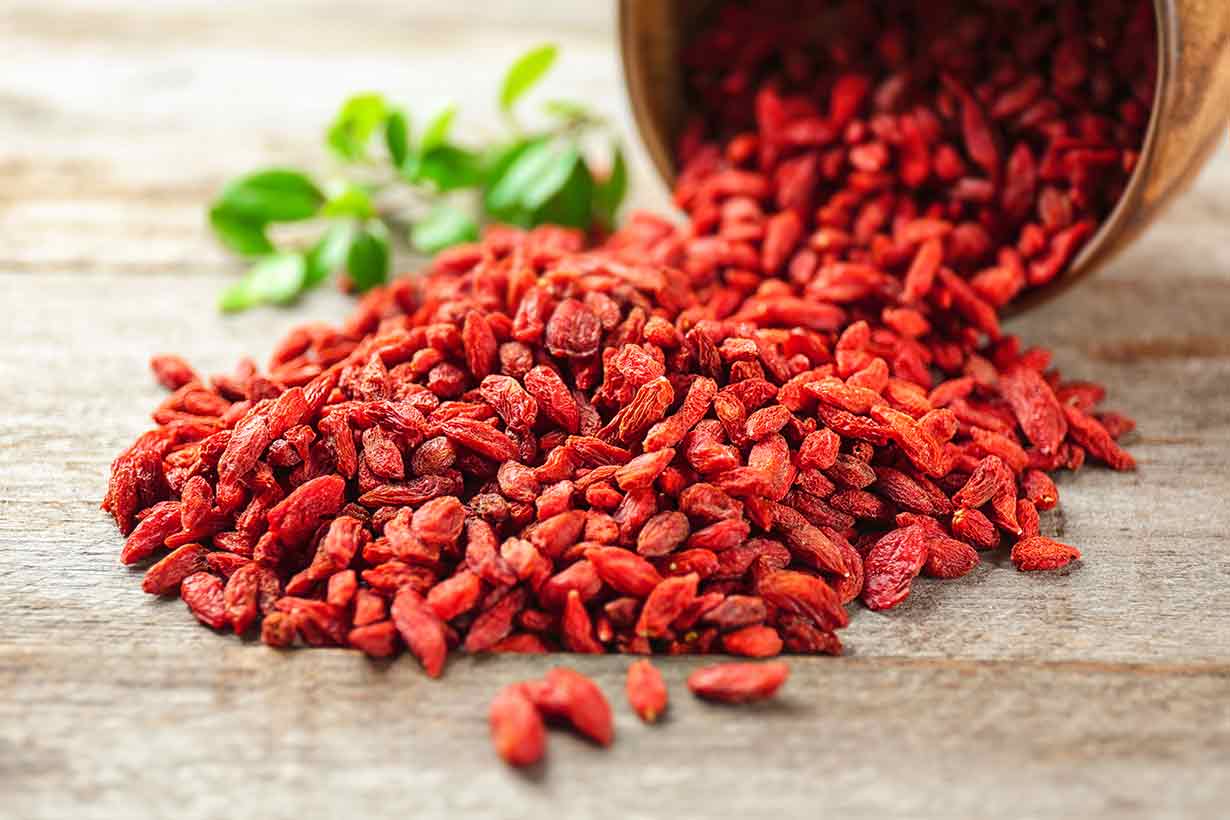Dried apricots are a popular dried fruit with a great taste, but what do they offer nutritionally?
This article examines dried apricots’ nutritional benefits, potential downsides, and nutritional values.
Table of contents
Benefits of Dried Apricots

Here are the main nutritional benefits of dried apricots, supported by citations to relevant scientific research.
1. A Rich Source of Polyphenols
A 2020 study into the biologically active compounds in dried fruits has shown that dried apricots contain high polyphenol levels (1).
Based on three conventional (non-organic) dried apricot samples, the fruits had a mean total polyphenol content of 322.35 mg per 100 grams.
These polyphenols included phenolic acids such as gallic acid, chlorogenic acid, p-Coumaric acid, ferulic acid, and benzoic acid, in addition to the flavonoids kaempferol, myricetin, and quercetin.
Polyphenols are plant compounds capable of having a biological effect on the body.
Additionally, research demonstrates that dietary patterns with higher polyphenol levels are strongly associated with a lower risk for chronic diseases and overall mortality (2, 3, 4).
2. High In Fiber
Dried apricots are a relatively good source of dietary fiber.
Per 100 grams, they contain 7.3 grams of fiber. A typical 30-gram serving provides 2.2 grams of fiber (5).
Dietary fiber has a range of health benefits. Among these, it plays a role in improving gut health, slowing blood sugar responses to food, binding toxins and carcinogens in the digestive tract, and potentially lowering LDL cholesterol (LDL-C) levels (6, 7, 8, 9).
3. Rich In Vitamin A Carotenoids
Dried apricots are also a good source of vitamin A, with 180 mcg of vitamin A (equal to 20% of the daily value) per 100 grams (5, 10).
Per 30-gram serving, this equals 54 mcg of vitamin A, or 6% of the daily value.
Among the vitamin A carotenoids contained within dried apricots, beta-carotene is the primary carotenoid (11).
Additionally, it is thought that carotenoids like beta-carotene may reduce the risk of age-related eye diseases. In this context, apricots are sometimes recommended as a rich source of this carotenoid (12).
4. Good Source of Potassium
Dried apricots have 1160 mg of potassium per 100 grams (25% of the daily value. Per 30-gram serving, this is 438 mg of potassium, which is 7% of the daily value (5, 10).
This potassium content is an excellent nutritional benefit of dried apricots because it provides 7% of the recommended intake in just a handful of dried apricots.
Additionally, potassium is one of the nutrients identified as a ‘dietary component of public health concern for the general U.S. population’ by the Dietary Guidelines for Americans. This is because many people do not obtain sufficient intakes of potassium from their diet (11).
For those looking for more potassium, dried figs are another great dried fruit option.
5. Dried Apricots Lower Blood Sugar Response When Displacing Simple Carbohydrate Foods
Whenever people consume carbohydrates, there is a rise in blood sugar levels that follows.
However, this is not something to worry about in a healthy individual with a non-excessive (or non-prolonged) blood sugar rise. It is a normal part of metabolism (12).
That said, different people have varied degrees of glucose tolerance, and carbohydrate-containing foods can more significantly impact individuals with insulin resistance and type 2 diabetes (13).
On this note, a 2018 randomized crossover trial looked at the impact of adding dried fruit to a simple carbohydrate food (white bread) on blood sugar responses (14).
This trial used four different dried fruits: dried apricots, raisins, sultanas, and dates.
Interestingly, when displacing half of the carbohydrates in a white bread meal, all four dried fruits saw a lower blood sugar response to the meal. However, the rise in blood sugar was only significantly reduced by dried apricots.
This makes sense when looking at the relative glycemic indexes (GI) of each food (14):
- White bread: 71
- Dried apricots: 42
- Raisins: 55
- Sultanas: 51
The GI is a numerical score from 0 to 100 given to food that represents how significantly the specific food raises blood sugar. For example, pure glucose has a score of 100; higher scores signify more significant blood sugar rises.
Since dried apricots have a relatively low GI, adding them to most simple carbohydrate foods, which typically have a high GI, should have a similar effect.
Other ways to decrease blood sugar rises from carbohydrate foods include adding a source of fat to the meal, such as a handful of nuts (15).
Nutrition Facts
The following section shows the full nutritional values for dried apricots per 30-gram serving. Thirty grams is equivalent to approximately three or four dried apricots.
The source for nutritional data is the USDA’s FoodData Central database. Daily values (% DV) are based on a 2000-calorie diet and have been calculated using the FDA’s published daily values (5, 10).
| Name | Amount | % Daily Value |
|---|---|---|
| Calories | 72 kcal | |
| Carbohydrates | 18.79 g | 6.8% DV |
| Fiber | 2.19 g | 7.8% DV |
| Sugars | 16.03 g | |
| Fat | 0.15 g | 0.2% DV |
| Saturated | <0.01 g | <0.1% DV |
| Monounsaturated | 0.02 g | |
| Polyunsaturated | 0.02 g | |
| Omega-3 | 0 g | |
| Omega-6 | 0.02 g | |
| Protein | 1.02 g | 2.0% DV |
| Cholesterol | 0 mg | 0% DV |
As the table shows, dried apricots are primarily a source of carbohydrates.
Furthermore, they contain little protein and virtually no fat.
Vitamins
| Vitamin | Amount | % Daily Value |
|---|---|---|
| Choline | 4.17 mg | 0.8% DV |
| Folate | 3.0 mcg | 0.8% DV |
| Vitamin A, RAE | 54 mcg | 6.0% DV |
| Vitamin B1 (thiamin) | 0.01 mg | 0.8% DV |
| Vitamin B2 (riboflavin) | 0.02 mg | 1.5% DV |
| Vitamin B3 (niacin) | 0.78 mg | 4.9% DV |
| Vitamin B5 (pantothenic acid) | 0.15 mg | 3.0% DV |
| Vitamin B6 (pyridoxine) | 0.04 mg | 2.4% DV |
| Vitamin B12 (cobalamin) | 0 mcg | 0% DV |
| Vitamin C | 0.30 mg | 0.3% DV |
| Vitamin D | 0 mcg | 0% DV |
| Vitamin E | 1.30 mg | 8.7% DV |
| Vitamin K | 0.93 mcg | 0.8% DV |
Dried apricots offer a good source of vitamin A, vitamin B3 (niacin), and vitamin E.
Minerals
| Name | Amount | % Daily Value |
|---|---|---|
| Calcium | 16.50 mg | 1.3% DV |
| Copper | 0.10 mg | 11.1% DV |
| Iron | 0.80 mg | 4.4% DV |
| Magnesium | 9.60 mg | 2.3% DV |
| Manganese | 0.07 mg | 3.0% DV |
| Phosphorus | 21.30 mg | 1.7% DV |
| Potassium | 348.60 mg | 7.4% DV |
| Selenium | 0.66 mcg | 1.2% DV |
| Sodium | 3.0 mg | 0.1% DV |
| Zinc | 0.12 mg | 1.1% DV |
Among the minerals they contain, dried apricots offer a good amount of copper and potassium.
Other
- Dried apricots are 31% water by weight
Do Dried Apricots Have Any Downsides?
While reasonably nutritious, dried apricots also have some potential downsides to consider.
Here is a summary of these potential drawbacks.
Sulfites and Sulfite Allergy
Some brands of dried apricots use a preservative known as sulfite for longer shelf life and to prevent spoiling.
However, in rare cases, some people can have adverse reactions and allergic-like reactions to sulfites. In more severe cases, sulfite intake has led to anaphylaxis (severe allergic reaction) (16, 17, 18).
According to Allergy UK, it is estimated that up to 13% of people with asthma have sulfite sensitivity (19).
Thus, anyone with sulfite sensitivity needs to carefully check the ingredients label of dried apricots (and any other dried fruits) for sulfite.
Anyone with a suspected sensitivity to sulfites should seek medical guidance.
Dried Apricots Can Be Easy To Over-consume
Another potential problem with dried fruit is that it can be easy to over-eat. This is because the fruit has lost its natural water content (and volume) and isn’t as filling as fresh fruit.
For example, consuming ten dried apricots or prunes would be relatively easy.
In contrast, it would be much harder to consume so many in their fresh fruit form- apricots and plums.
Despite this, dried apricots have the same calorie content as fresh ones.
Also, as with the above example, this is not just an issue for dried apricots alone, and it also applies to other dried fruit.
For more information on the benefits and downsides of dried fruit in general, see this article here:
Is Dried Fruit a Healthy Choice?
How To Use Dried Apricots
There are many ways in which we can use dried apricots. Here is a selection of them for some ideas:
- Combine with other dried fruits and nuts to make a trail mix
- Add to porridge or cereal
- Mix into a yogurt
- Dried apricots work well for flavor (and texture) when used in a stir-fry
- As a snack on their own
- In baking
- As an ingredient in soups, stews, and curries
Common Questions
Here are some answers to commonly asked questions about dried apricots.
Although ‘unsweetened’ dried apricots taste sweeter than fresh apricots, the two have the same total sugar content. Since apricots are dehydrated to make dried apricots, the resulting loss of water content means the taste of the naturally occurring sugars in apricots isn’t as diluted. Most commercially available dried apricots are unsweetened. However, sweetened dried apricots do exist, which have extra sugar added. Therefore, it is important to check package labeling to ensure no added sugar.
A typical serving size is approximately 30 grams, equal to three or four dried apricots – depending on their size.
Yes, fresh and dried apricots generally have similar nutritional content. However, certain vitamins or minerals may be present in slightly higher or lower amounts due to the different manufacturing and storage processes dried apricots go through.
Final Thoughts
Dried apricots are a great-tasting dried fruit that provides good amounts of fiber, copper, potassium, and vitamins A and E.
On the other hand, while nutritionally similar to fresh apricots, they can be easier to over-consume in their dried form.
However, when used at their recommended serving size of 30 grams, dried apricots can be a nutritious choice and part of a healthful diet.






